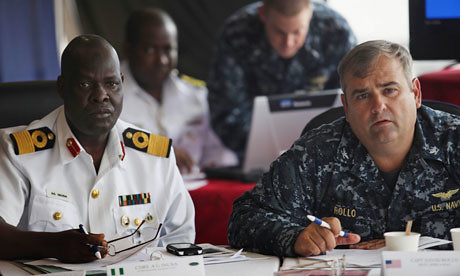
A high-level meeting between the Navies of the United States and Nigeria to discuss cooperation in the waters off the coast of Africa. AFRICOM is carrying out its first full operation against Libya., a photo by Pan-African News Wire File Photos on Flickr.
Piracy off west Africa increases sharply
Number of incidents in waters of Nigeria and Benin fuel fears region's pirates could pose similar risk to shipping as Somalia's
David Smith, Africa correspondent guardian.co.uk, Friday 12 August 2011 16.43 BST
US and Nigerian naval officials meet to discuss the increased risk to shipping from pirates off the coast of west Africa
Pirate attacks off the coast of west Africa have increased sharply, figures show, raising fears that the region could emulate Somalia as a menace to shipping.
Nigeria and Benin have reported 22 piracy incidents so far this year, including two in recent days, the International Maritime Bureau (IMB) said. Benin did not suffer any such attacks last year.
"I believe we are nearly at a crisis here, and if it's a crisis there has to be action," Rear Admiral Kenneth Norton, of the US Naval Forces Europe-Africa, told the Associated Press.
Piracy in the Gulf of Guinea, which stretches along the coasts of a dozen countries from Guinea to Angola, has escalated from low-level armed robberies to hijackings, cargo thefts and large-scale robberies over the past eight months, according to the Denmark-based security firm Risk Intelligence.
Nigeria, Benin and nearby waters were this month listed in the same risk category as Somalia by the London-based insurers Lloyd's Market Association. Neil Smith, its head of underwriting, said: "It's always been a concern for the shipping industry. The model that's taken root in Somalia might spread to other areas."
Pirates pose a threat to commercial shipping coming into Lagos's busy Apapa Port and the thriving used car market based in Benin's commerical capital, Cotonou.
Benin collects 40% of government receipts from port activities each year. Maxime Ahoyo, its navy chief of staff, said: "Dozens of ships are already fleeing our shores due to fears of these pirates."
While lower than the 163 attacks attributed to Somali pirates in the first half of 2011, analysts say the number of attacks off Nigerian waters is under-reported because some ships carry illegal oil cargo and others fear their insurance rates will rise.
Cyrus Moody, a manager at the IMB, said: "It's definitely more than we are showing in ours stats. We are calling for vessels to report more when incidents happen. This is the only way for a realistic picture of the crisis."
West African pirates may have been encouraged by the impact of their Somali counterparts but there also important differences, analysts say. Their focus tends to be on robbery rather than seizing vessels.
Those from Nigeria have also been more willing to use violence, beating crew members with rifle butts and electric cables and shooting and stabbing those who get in the way. At least two fatalities are known to have occurred. In some cases, crew members are taken ashore and held for ransom.
Pirates from Benin have tended to steal oil cargo and then release the ship. Moody said: "The recent incidents off Benin have been very different from Somalia. They do not hijack the entire vessel as the Somalis do. The incidents are more hit and run and robberies.
"We don't believe the Somali model is being copied. Lawlessness and lack of government in Somalia allows pirates to keep vessels on the coast for months on end. We hope that won't be possible in west African countries or anywhere else."
Officials from Nigeria's navy, its maritime industry and other groups met US officials aboard the HSV 2 Swift off Nigeria's coast this week to discuss issues including anti-piracy strategies.
The US and other western nations have an anti-piracy armada patrolling the waters off east Africa, but there is no west African counterpart, leaving Nigeria and its neighbours to stop the growing attacks on their own.
Experts believe many of the pirates come from Nigeria, where corrupt law enforcement allows criminality to thrive. Antony Goldman, a west Africa analyst at London-based PM Consulting, said the illegal sale of oil had created "a culture of lawlessness" in the coastal zone.
He added: "In Somalia, you've got no government. In Nigeria there is a maritime capacity, but there's an issue of the extent to which the security forces are working with armed groups."
2011 Guardian News and Media Limited or its affiliated companies. All rights reserved.
No comments:
Post a Comment